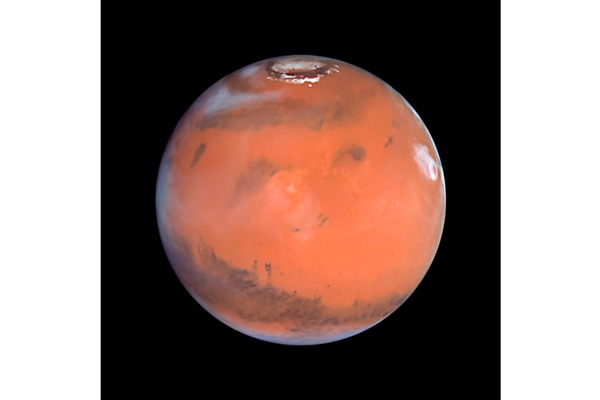Boeing chief executive officer Dennis Muilenburg and SpaceX founder Elon Musk both have Mars dreams. But who will get there first?
The space race that first brought humans to the moon was propelled by a tense international rivalry between the United States and the Soviet Union. A half-century later, Boeing’s chief executive envisions a competition between the aeronautics manufacturer and SpaceX having the same result, minus the cold war.
Except, this time, the destination is the Red Planet.
“I’m convinced the first person to step on Mars will arrive there riding a Boeing rocket,” Dennis Muilenburg said at an event hosted by The Atlantic Magazine in Chicago on Oct. 4.
The Boeing Company is already in partnership with NASA to develop the Space Launch System, a heavy-lift rocket for deep space exploration. But Mr. Muilenburg’s comments indicate an increasing rivalry between Boeing and SpaceX to be the first to reach Mars and, perhaps, colonize it. This competition could push progress, as SpaceX founder and chief Elon Musk welcomed challengers when he laid out his plans just a week before for a Mars colony.
“The goal of SpaceX really is to build the transport system. It’s like building the Union Pacific railroads,” Mr. Musk told the International Astronautical Congress (IAC) in Guadalajara, Mexico, on Sept. 27.
Muilenburg indicated a growing competition between Boeing and SpaceX when he spoke of his vision for a commercial space-travel market, according to Bloomberg. He imagined hotels in orbit, hypersonic jets traveling between continents in two minutes, and a Boeing rocket bringing the first human to Mars.
Boeing has been working with NASA to make that a reality. The public-private partners have been developing a Space Launch System rocket, which NASA hopes will bring the first humans to Mars by 2030.
The aerospace company has long partnered with NASA. It built the first stage for the Saturn V, the most powerful US rocket built to date, which took men to the moon.
SpaceX’s Mars timeline is a bit more ambitious. Musk has said his company plans to bring the first humans to the Red Planet five years sooner, in 2025, with the eventual goal of human colonization of Mars.
The two companies have been in competition ever since SpaceX started developing technology to reach space. In 2012, NASA chose Boeing, SpaceX, and Sierra Nevada Corp. to taxi astronauts to the International Space Station (ISS) orbiting Earth. NASA had the three companies share $1.1 billion in funding, with Boeing receiving the most money at the time. But SpaceX was the first of the three companies to deliver cargo to the ISS. Just like Russia charges NASA a fee to shuttle astronauts to the ISS now, the companies will have NASA pay them per seat.
But corporate ventures to Mars and deep space has some scientists, lawyers, philosophers, and science fiction writers worried.
“I personally would hate that: turning the cosmos into a kind of billionaires’ playground,” Kim Stanley Robinson, an acclaimed science fiction writer, told The Christian Science Monitor’s Lonnie Shekhtman last month.
Others have raised concerns about the reign a corporation or extra-planetary power could hold over resources on the Red Planet.
“If somebody gets control of oxygen, they could very well have control over the whole population and could threaten dire consequences in return for extraordinary levels of power,” Charles Cockell, an astrobiologist at the University of Edinburgh, pointed out to the BBC in 2014.
But other countries are also aiming for Mars. The space programs that have already sent uncrewed missions to the fourth planet include the US, Russia, the European Space Agency, and India, with China having plans to follow.
With the price of putting an astronaut on Mars in the billions of dollars, Musk envisions funding the project through some type of public-private partnership, writes Ms. Shekhtman. SpaceX, for instance, would generate income from launching satellites and doing work on ISS.
Source: The Christian Science Monitor

































Leave a Comment
You must be logged in to post a comment.